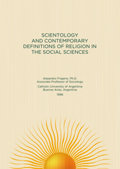Beginning in the middle of the current century, Western societies have observed a renewed interest in the diversity of expressions of religious phenomena, Such interest is due to:
- the rise or development of new religions, particularly in the United States of America (such as the International Society for Krishna Consciousness, the Church of Scientology, the Mission of Divine Light);
- the extension to new geographical areas of religions already established in others (such as some Eastern religions in America and Europe; Pentecostalism, the Church of Jesus Christ of Latter-day Saints and the Jehovah’s Witnesses from the United States in South America and Europe; the Santeria from Cuba to the United States and countries of Central America; and the Umbanda from Brazil to Uruguay, Paraguay, Argentina, Chile and to a lesser extent the United States and Europe);
- the “revivals” of the established religions (as in the charismatic reformations in evangelism and in Catholicism, the rise of spiritualist Catholic groups, etc.) and
- the rise of a diverse, uncentralized spiritual subculture (comprised of what has been given the name New Age).
The interest in religious diversity revived old discussions within the social sciences which resulted in more accurate definitions of religious phenomena. Distinct groups of social scientists have opted for different types of definitions often responding to their immediate theoretical interests.
These different types of definitions include:
Substantive definitions of religion which attempt to characterize “from within” or in terms of the intrinsic significance;
Comparative definitions of religion which approach it by distinction from other systems of meanings;
Functional definitions of religion which characterize it in terms of its consequences over other spheres of social and personal life;
Analytical definitions of religion which characterize it by the distinct aspects which religious phenomena encompass; and
Emic definitions of religion which consider religious those phenomena which the members of its society or its institutions consider to be such.
From the viewpoint of the social sciences, the task of establishing whether a body of beliefs and practices constitutes a religion requires that one take heed of the diversity of definitions of religion in the current discussion in these disciplines.
In the following pages we propose to establish if Scientology constitutes a religion, taking into account the diverse definitions by which this term is currently characterized by the social sciences.





























